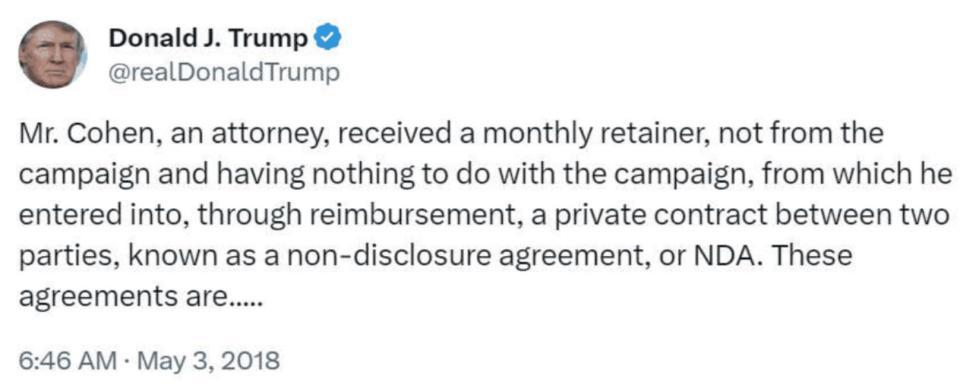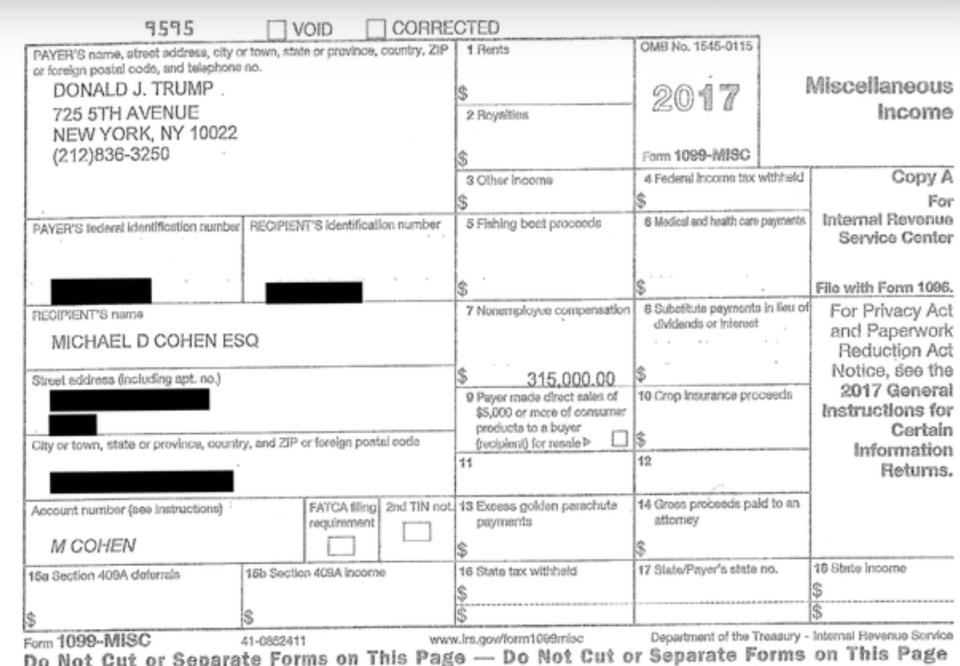-
At Tuesday’s closings, defense attorney Todd Blanche tried the classic “but if he he did do it” defense.
-
If Trump he did falsifying documents, he did not do so with the required criminal intent, Blanche argued.
-
He then showed jurors three exhibits from the prosecution where Trump admits to repaying hush money.
It’s the defense’s classic closing argument: it wasn’t my client, ladies and gentlemen – but if he he did do that, it wasn’t intentional.
This is the argument that Donald Trump’s lawyer Todd Blanche tried the secret money jury in Manhattan on Tuesday.
Yes, Blanche spent most of her arguments denying that Trump committed the charges he is on trial for.
Prosecutors say Trump falsified 34 business records hide a year’s worth of reimbursement payments from his then lawyer, michael cohenwho paid $130,000 in hush money to porn star Stormy Daniels.
Trump was not involved in any such conspiracy to influence the 2016 election, Blanche told jurors in detail Tuesday during a three-hour briefing.
But if he it was involved, there was no necessary intention to commit fraud, Blanche argued. How could there be, he asked, when Trump has freely and repeatedly admitted to reimbursing Cohen?
Blanche then showed the jury three pieces of the prosecution’s case.
Each exhibit – showing a tax form, a tweet and a government ethics form – was displayed on courtroom screens.
Each reinforces the prosecution’s argument: that Trump knew full well that the $130,000 he paid Cohen in installments throughout 2017 was for reimbursement and not legal fees, as his business records falsely claimed.
“The government has to prove that President Trump caused these entries — even if they were false — with the intent to defraud,” Blanche told jurors.
“Where is President Trump’s intention to defraud?” the lawyer asked the jury.
Prosecutors must demonstrate that Trump intended to defraud in order to prove first-degree falsification of business records, the state charge that Trump allegedly violated 34 times throughout 2017, including when he personally signed nine of Cohen’s refund checks. .

At another point in Blanche’s summations, he earned the judge’s ire by telling jurors, “You can’t send someone to prison based on what Michael Cohen is saying.” Jurors must weigh only the facts in their deliberations – not the potential punishment.
“That was outrageous, Mr. Blanche,” state Supreme Court Justice Juan Merchan told Blanche after jurors were dismissed for lunch.
“Someone who has been a prosecutor as long as you have and a defense attorney as long as you have knows this is highly inappropriate,” the judge said.
“It’s simply not allowed. Period”, added the judge. He gave curative instructions to the jury, explaining that Blanche’s comment was “inappropriate” and that if Trump is convicted, “no prison sentence is necessary.” Falsifying business records carries a penalty ranging from zero to four years in prison.
Here are the three pieces of evidence that Blanche displayed in court for jurors as “proof” that Trump had nothing to hide and therefore could not have intended to defraud anyone.
1. A 2017 1099 tax form
The Trump Organization – and Trump as an individual – reported paying Michael Cohen a total of $420,000 in 2017.
Prosecutors say this is the amount that Trump’s then-CFO, Allen Weisselberg, calculated by what Cohen would receive in reimbursement for his spending of hush money, plus taxes and other money that Trump owed him.
-
Why would Trump announce these payments to the IRS “if there was some deep-rooted intent to defraud on the part of President Trump?” Blanche asked the jurors.
Manhattan District Attorney’s Office/BI


2. A tweet from 2018
On May 3, 2018, Trump posted a somewhat garbled tweet that admitted that the payments he made to Cohen throughout 2017 were, in his words, “reimbursement.”


This tweet was made just five months after writing the last of nine $35,000 checks to Cohen. Each check was labeled “RETAINER”.
3. A government ethics form
Also during closing arguments, Blanche showed jurors the so-called “Executive Branch Personnel Public Financial Disclosure Report” for the year 2017. This was the then-president’s mandatory disclosure of his assets and liabilities.
-
Under “Liabilities” — which is the section where Trump must list the money he borrowed — Trump certified that in 2017, he “fully repaid” Cohen an interest-free amount of between $100,000 and $250,000.
Excerpt from a footnote on a financial disclosure form Donald Trump signed in 2018, which reads: “Mr. Trump fully reimbursed Mr. Cohen in 2017.”
“President Trump tweeted what happened when the matter came to light” and then signed a government ethics form that also admitted reimbursement, Blanche told jurors Tuesday.
“This is not proof of any intent to defraud,” Blanche said.
The defense attorney spent most of his summation impugning the credibility of Cohen, whose testimony is critical to the prosecution’s case.
Cohen is “literally like an MVP of liars,” Blanche told the jurors. Two jurors – a woman in the front row and a man in the back row, smiled when Blanche called Cohen “The ‘Gloat'” – like the Biggest Liar of All Time.
Deliberations are expected to begin on Wednesday.
Read the original article at Business Insider









































